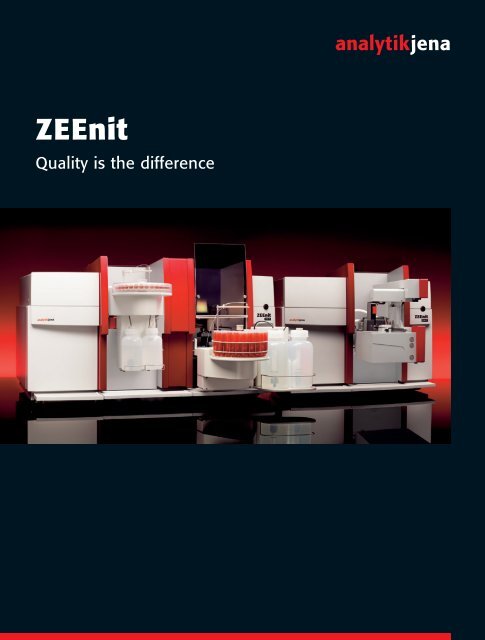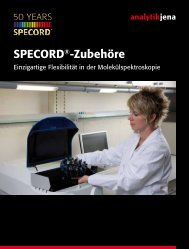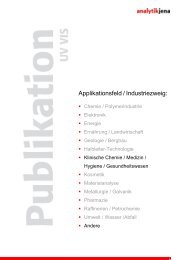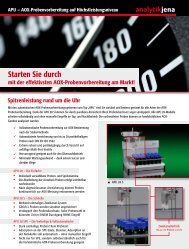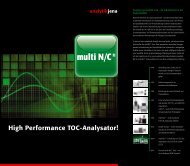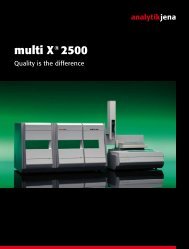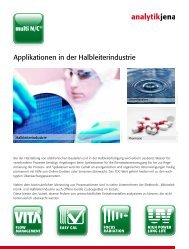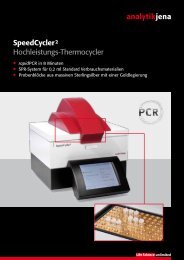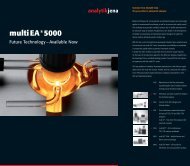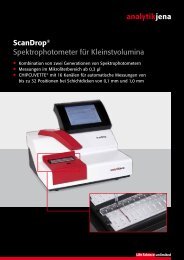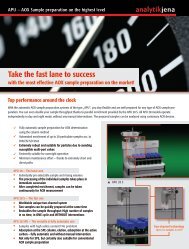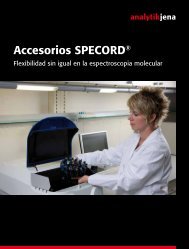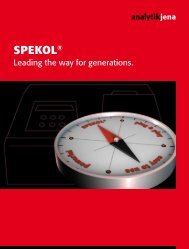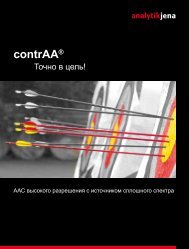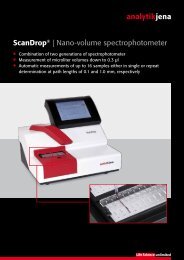You also want an ePaper? Increase the reach of your titles
YUMPU automatically turns print PDFs into web optimized ePapers that Google loves.
ZEEnit<br />
Quality is the difference
More than 150 years of experience in the field of<br />
Optical Spectroscopy<br />
<strong>Analytik</strong> <strong>Jena</strong> has a long tradition in developing high quality and precision<br />
analytical systems which dates back to the inventions made by Ernst Abbe and<br />
Carl Zeiss. Today <strong>Analytik</strong> <strong>Jena</strong> is a leading manufacturer of high performance<br />
analytical instruments and one of the most innovative companies.<br />
1874 First spectrometer<br />
1924 First Pulfrich photometer – the<br />
basis for the development of<br />
spectrophotometry in <strong>Jena</strong><br />
1937 First flame photometer – Carl Zeiss<br />
establishes the methodology of flame<br />
photometry<br />
1963 SPEKOL and SPECORD update the<br />
tradition of Pulfrich photometers in <strong>Jena</strong><br />
1969 Prototype of the first commercial<br />
flame AAS<br />
1971 Launching of the first AAS 1 of<br />
Carl Zeiss <strong>Jena</strong><br />
1982 First simultaneously measuring<br />
UV/Vis spectrometer with MCS<br />
1993 Introduction of the first Zeiss-AAS<br />
graphite system with transverse-heated<br />
graphite furnace<br />
2000 AAS ZEEnit, the first transverse-heated<br />
Zeeman graphite furnace AAS<br />
instrument with variable magnetic<br />
field and 3field mode<br />
2003 First high speed photometer with<br />
50 cell changer and Diode Array Detector<br />
2004 <strong>Analytik</strong> <strong>Jena</strong> <strong>AG</strong> presents the first<br />
High-Resolution Continuum Source AAS<br />
(HR-CS AAS) worldwide, a revolution<br />
in Atomic Absorption<br />
2006 HR-CS AAS for graphite furnace<br />
technology
4<br />
ZEEnit<br />
Recent technologies translated into a family<br />
of instruments that sets new standards<br />
Decades of experience in the development of spectrometers,<br />
plus the most recent findings made in electronics, magnetic field<br />
technology and furnace design, have gone into the ZEEnit<br />
series. The ZEEnit 700 P completes yet another milestone in<br />
spectrometer development at <strong>Analytik</strong> <strong>Jena</strong>: A system that com-<br />
bines excellent analytical performance with a high degree of<br />
user friendliness.<br />
Dual atomizer concept<br />
A design that is impressive because of its functionality. Change<br />
of techniques without any mechanical movement, conversion or<br />
readjustment – immediately ready for use.<br />
Transverse-heated graphite furnace<br />
The future-oriented furnace heating concept, which can cope<br />
with a variety of samples, including complex matrices and<br />
refractory elements.<br />
Third-generation magnetic field technology<br />
Maximum sensitivity and optimum matching to the analytical<br />
problem thanks to the variable magnetic field strength up to 1.0<br />
Tesla and the use of two different correction modes. Expansion<br />
of the linear working range by means of the 3field technique,<br />
and a dynamic mode for automatic adaptation to varied element<br />
contents – the ZEEnit opens up unparalleled capabilities in<br />
Zeeman graphite furnace AAS.<br />
Automation has never been more convincing<br />
Flexibility and efficiency, musts in fully automatic sample prepa-<br />
ration, are provided by AS 51/52 and MPE 60 z, intelligent<br />
autosamplers for more than just automatic dosing. Functions<br />
such as intelligent dilution and preconcentration, automatic dos-<br />
ing of modifiers, and automatic depth adjustment, combined<br />
with high dosing precision, make overnight operation a mere<br />
routine and guarantee profitable sample throughputs.<br />
ZEEnit Plus<br />
The new ZEEnit series includes the ZEEnit 650 P, a Zeeman AAS<br />
for graphite furnace and hydride technology and the ZEEnit 700 P,<br />
a compact tandem spectrometer for flame mode, hydride and<br />
graphite furnace technology. Both devices are able to analyze<br />
liquid and solid samples in one and the same system.<br />
Both systems combine intelligent design with optimum func-<br />
tionality and convincing performance features:<br />
Plus 8 lamp changer for maximum automation and<br />
sample throughput<br />
Plus Single and double beam available<br />
Plus D2 background correction and Zeeman third<br />
generation background correction<br />
Plus Integrated RFID Tool for working with coded<br />
lamps<br />
Plus Integrated super lamp power supply for best<br />
analytical performance<br />
Plus Integrated High-end Vision Tool for best observati-<br />
on and control of sample injection and sample drying<br />
in the graphite tube<br />
Plus Direct analysis of solid samples
A match for every requirement<br />
Variable sample feeding techniques<br />
This is unique: Smooth feeding of liquids and solids (direct<br />
analysis), and fast change between both techniques.<br />
ASpect LS data analysis and control software<br />
A convincing software concept that is not only efficient for laboratory<br />
routine but also gives the user every freedom for method<br />
development and optimization. Analytical quality assurance and<br />
validation feature greatly in this product.<br />
Long high-performance life guaranteed<br />
for 10 years<br />
Quartz coated optics and encapsulation guard against corrosive<br />
laboratory atmospheres and extend the life span – an advantage<br />
we pass on to our customers: A long-term warranty of ten years<br />
is standard for our atomic absorption spectrometers!<br />
Thoroughly studied burner-atomizer system<br />
A burner-nebulizer-system optimized over many AAS generations<br />
and a mature mixing chamber concept ensures stable<br />
operation and high repeatability in the flame mode.<br />
Designed-in safety<br />
Safe operation is a top priority especially in flame AAS.<br />
With a multitude of sensors, all safety-relevant parameters are<br />
constantly monitored and controlled. All functions, from flame<br />
ignition to switching types of gas and to safe quenching, are<br />
PC controlled and fully automated.<br />
ZEEnit 700 P with hydride system<br />
and AS 52 s<br />
5
6<br />
ZEEnit<br />
State-of-the-art technology for higher<br />
accuracy and precision<br />
A unique furnace design<br />
The transverse-heated graphite furnace is a must where optimum<br />
atomization conditions and high sample throughput are required<br />
simultaneously. This clearly superior concept has, for a number<br />
of years, been successfully employed in all <strong>Analytik</strong> <strong>Jena</strong> graphite<br />
furnace AAS systems. It guarantees uniform temperature all along<br />
the optical axis throughout the tube and eliminates memory and<br />
condensation effects that occur at the cooler tube ends of con-<br />
ventional, longitudinally heated graphite tubes. Lower atomizing<br />
temperatures prolong tube life. Problem-free analysis of low-<br />
volatility elements (e.g., vanadium, molybdenum), and the<br />
direct analysis of solid samples are possible.<br />
Sensorless adaptive temperature control (STC) completely monitors<br />
the function of the graphite tube and compares important actual<br />
furnace parameters with the settings. Deviations of the tube resist-<br />
ance caused by chemical corrosion and ageing of the graphite<br />
material are immediately corrected, and the correct temperature is<br />
readjusted. The temperature inside the graphite tube is monitored<br />
and recalibrated by a unique emission-independent, pyrometric<br />
quotient method. A formation routine optimally prepares new<br />
tubes for the analyses and checks the overall status of the fur-<br />
nace. This is the only way to ensure that your measurements<br />
stay comparable over long times.<br />
STPF Left to right:<br />
Thanks to the consistent implementa-<br />
tion of the “Stabilized Temperature<br />
Platform Furnace” (STPF) concept,<br />
atomization interferences are reduced<br />
to a minimum. This directly im-<br />
proves the accuracy of the analytical<br />
data. The ZEEnit thus meets all require-<br />
ments for interference-free graphite<br />
furnace analyses. This considerably<br />
increases efficiency, and saves time.<br />
Graphite tube change<br />
without adjustment<br />
SSA 600<br />
Solid sample carrier<br />
Liquid dosing unit<br />
The resulting benefits for your daily routine speak for themselves:<br />
Marked improvement in accuracy<br />
Transverse-heated graphite tubes considerably diminish many<br />
chemical interferences and therefore matrix effects. As a conse-<br />
quence, your analyses are almost memory-free.<br />
Cost-efficient analyses<br />
To save operating costs, you can choose between two types of<br />
tubes:<br />
The platform tube allows you to determine all elements with<br />
just one tube – no need to change tubes during a multielement<br />
routine. For simple applications, the low-cost wall tube is the<br />
best choice.<br />
Time-saving and amazingly easy<br />
The transverse-heated tube design makes tube change and<br />
adjusting the sampler pipetting tip easier than ever before.
Flexible analysis for all kinds of samples<br />
The ZEEnit is the only system worldwide that permits the direct<br />
feeding of both liquid and solid samples using the solidAA ®<br />
technology. The dream of smoothly changing between liquid<br />
and solid techniques has come true. With its built-in Zeeman<br />
system, the ZEEnit of <strong>Analytik</strong> <strong>Jena</strong> excel with the exacting<br />
demands the direct analysis of solids places on background cor-<br />
rection and on the graphite furnace.<br />
Two different feeding systems for solid samples<br />
are available:<br />
SSA 6 z – manual solid sampler<br />
Manual module for the reproducible insertion and removal of<br />
the sample carrier. Even with external manual weighing, auto-<br />
matic data transfer is made via the ASpect LS software.<br />
SSA 600 – automatic solid sampler with integrated<br />
microbalance<br />
This system allows routine solid AAS. Not only transport of the<br />
loaded sample carrier into the furnace but also weighing with the<br />
fully integrated microbalance is completely automated.<br />
Liquid dosing unit for versatile applications<br />
With the new liquid dosing module, solid sampling becomes<br />
even easier. A liquid calibration out of one or more stock solu-<br />
tions now is done automatically by the sampler. The modifier is<br />
also automatically pipetted to each solid or liquid sample.<br />
A specially optimized sample carrier can be used for many kinds<br />
of solids – from powders to granulates. The carrier geometry<br />
ensures optimum atomizing conditions in the solid tube and reli-<br />
able transfer processes in sample feeding.<br />
The analytical advantages<br />
Analysis of the unadulterated original samples<br />
No time-consuming sample digestion<br />
No dilution effect with substances harmful to health or<br />
the environment<br />
Minimized risk of contamination<br />
High sensitivity<br />
Genuine microvolume method (sample volumes in the<br />
order of µg or mg)<br />
Detection limits in the pg and fg ranges<br />
The economic benefits<br />
Speed<br />
Reduced costs<br />
Flexibility<br />
Efficiency
8<br />
ZEEnit<br />
User-oriented:<br />
New standards of operating convenience<br />
The „Dual-Atomizer“ concept, an important component of<br />
the new design concept, guarantees a fast and unproblematic<br />
change from flame mode to graphite technology. Completely<br />
without readjustment or complicated change of autosampler<br />
— one click in the software does it all. That means fastest opera-<br />
tional readiness and simple handling for the user.<br />
Among the basic conditions for smooth operation in trace anal-<br />
ysis are regular maintenance and cleaning of the furnace parts.<br />
The furnace slides out of the sample compartment to a defined<br />
parking position, which provides the necessary access for clean-<br />
ing and maintenance.<br />
Completely automated optimization of the<br />
parameters<br />
Great emphasis is placed on innovative functionality when<br />
developing devices. Fully automatic routines optimize the analy-<br />
sis process and thus also guarantee the optimum conditions at<br />
high sample throughput and therefore the maximum reliability<br />
of the results.<br />
Pyrolysis and atomization temperatures are changed using the<br />
„Optimization of the furnace parameters“ software function and<br />
adapted to the respective application. At the same time, an inte-<br />
grated camera, the „Furnace Vision Tool“ monitors the deposi-<br />
tion of droplets and the drying phase in the graphite tube.<br />
Information in unique full-color image quality provides detailed<br />
monitoring and effective correction.<br />
In the new ZEEnit family all lamp data are automatically read<br />
and recorded using a RFID tool for highest operator<br />
convinience.<br />
The lamp is identified during initialization, the operating para-<br />
meters are set and the running times are monitored.<br />
Display of coded lamp parameters<br />
Sequences of the integrated camera in the graphite furnace
ZEEnit 650 P and SSA 600 Graphite furnace in service position<br />
The ZEEnit 700 P offers solutions for fast, automated routine<br />
operation, whether absorption or emission. To achieve optimum<br />
results, fuel composition and burner height can be automatically<br />
adjusted to the respective sample. The fully automated Total<br />
Flow Gasbox, which is integrated in all ZEEnit systems, ensures<br />
the settings and monitoring of all gas parameters.<br />
Thanks to automatic height adjustment, the burner head is<br />
always at a perfect position. Even for changing requirements and<br />
measurements of different elements in one sequence the condi-<br />
tions are always kept at an optimum by the efficient optimization<br />
routine.<br />
Accessories<br />
Accessories such as the Segmented Flow Star (SFS) or the Scraper<br />
help you face the challenges of complex matrices in flame analysis.<br />
The SFS is capable of dosing minuscule sample volumes by time-<br />
controlled flow injection. Thanks to continuous system rinsing, it<br />
extends the stable working time with samples of high matrix or salt<br />
contents. The Scraper facilitates work with the nitrous oxide flame.<br />
It automatically removes graphite deposits from the burner slot,<br />
ensuring continuous operation and minimizing manual cleaning<br />
chores.<br />
Left to right:<br />
Coded HCL<br />
SFS 6 Injection<br />
Module<br />
Scraper – the automatic<br />
cleaning module<br />
9
10<br />
ZEEnit<br />
For maximum efficiency and high sample<br />
throughput<br />
MPE 60 z<br />
The automation concept<br />
AS 51 s and AS 52 s make your routine analyses of standards<br />
and samples almost fully automatic. Integrated in the over-<br />
all concept of the instrument, either sampler can be simply<br />
installed directly into the sample compartment. This saves space<br />
and minimizes tubing lengths – the best way to prevent con-<br />
tamination in case of real samples.<br />
To prolong the service life of the samplers, all parts possibly<br />
contacted by acids or solvents are made of corrosion-resistant<br />
materials. Varied, freely selectable rinsing routines markedly<br />
reduce the risk of carry-over and contamination.<br />
The intelligent dilution function of the AS 52 s makes manual<br />
dilution, a time-consuming and error-prone process, unneces-<br />
sary. Automatically, it dilutes your samples down to a factor of<br />
1:625. Therefore, sample lots with greatly varying element con-<br />
tents can be processed without interruption.<br />
More than only a sampler<br />
With the MPE 60 z, the autosampler for graphite furnace<br />
AAS of liquid samples, automated sample preparation and<br />
analysis are easy:<br />
Automatic generation of reference curves from one or<br />
several stock solutions (up to ten points)<br />
Dosing of extremely small sample volumes with excel-<br />
lent repeatability<br />
Automatic sample dilution and enrichment by a speci-<br />
fied factor<br />
Intelligent automatic dilution of samples exceeding the<br />
calibration range; clean control limits to avoid contami-<br />
nation<br />
Automatic enrichment of samples below the calibration<br />
range<br />
Unique automatic correction of the immersion depth for<br />
every vessel containing sample or other liquid<br />
Robust, low-noise operation<br />
Fast, easy adjustment<br />
Its many functions and the automatic running of optimizing<br />
routines make the MPE 60 z an intelligent sample preparation<br />
station.<br />
If concentrations exceed the calibration range, an automatic<br />
clean control prevents contamination of the subsequent sam-<br />
ples. All these functions are completely integrated in the<br />
autosampler, so no costly, space-consuming extras are required.
AS 52 s Hydride system<br />
With a simple lock mechanism, changing burner heads is just as<br />
easy as attaching the sample cell unit for hydride technology.<br />
The determination of mercury and the hydride-forming elements<br />
down to the lowest concentration ranges has always been a special<br />
challenge. The ZEEnit takes up that challenge with a diversity of<br />
solutions. Combination with the hydride systems can be imple-<br />
mented in two ways.<br />
The traditional way: Atomization in the electronically heated<br />
quartz cell.<br />
The future-oriented way: Hydride formation coupled with<br />
Electrothermal Atomization.<br />
HydrEA technique<br />
Coupling the hydride and graphite furnace techniques opens up<br />
new prospects for the determination of hydride-forming elements<br />
(e.g., As, Se, Sb). As these elements can be preconcentrated in<br />
the graphite tube, the detection sensitivity increases, cross-over<br />
effects and contamination problems are minimized and matrix<br />
influences are reduced – the appropriate response to the demand<br />
for ever lower detection limits.<br />
Sample tray<br />
11
12<br />
ZEEnit<br />
Third generation Zeeman magnetic field<br />
technology<br />
In addition to efficient deuterium background correction, Zeeman<br />
technology is a must for many applications. In other commercially<br />
available Zeeman systems, the magnetic field has a fixed strength.<br />
The ZEEnit allows the user to vary the magnetic field strength.<br />
The advantages are obvious:<br />
Optimum sensitivity<br />
This is the only way to exploit the benefits of the Zeeman system<br />
for all elements. Varied according to the Zeeman factor, the mag-<br />
netic field strength guarantees optimum sensitivity in every case.<br />
Flexibility with varying concentrations<br />
To ensure fully automatic routine work despite varying concen-<br />
trations, the dynamic mode combines the 2field and 3field tech-<br />
niques. Two absorbances are measured within a measurement<br />
cycle, and two calibration curves established (Fig. 3). Depending<br />
on the concentration, either the high- or low-sensitivity calibra-<br />
tion curve is used for data analysis. Large batches of samples<br />
with varied contents can thus be processed fully automatically.<br />
Fig. 1: Expansion of the linear working range<br />
Fig. 2: Higher sensitivity through an increase of the<br />
magnetic field strength<br />
Wide dynamic measuring range<br />
Added to the conventional 2field mode (magnetic field on or<br />
off), the unique 3field mode (magnetic field off, medium, or<br />
maximum) provides the user with unparalleled analytical capa-<br />
bilities. The use of the variable magnetic field in the special data<br />
extraction mode makes it possible to calibrate over more than<br />
two concentration decades in Zeeman GF AAS. The measuring<br />
range and the linearity are considerably expanded towards higher<br />
element concentrations. High-factor dilutions are no longer<br />
required. Problems caused by diluent contamination and error<br />
sources in sample preparation can be avoided. This saves time<br />
and facilitates routine with higher element contents also.<br />
Fig. 3: Application of the<br />
dynamic mode for Pb<br />
calibration from 10 to<br />
1000 µg/L
Clearly structured and flexible – just how<br />
modern software should be<br />
ASpect offers both routine operation and multifarious develop-<br />
ment and optimization facilities. It allows comprehensive control,<br />
monitoring and recording of all processes run in the spectrometer<br />
and its accessories.<br />
Advanced user-friendliness<br />
Simple, routine handling on one hand, great flexibility on the<br />
other – ASpect meets both requirements with perfection. The<br />
clearly laid-out user interface makes method development on the<br />
screen fast and simple. Ready-to-use cookbook programs facilitate<br />
getting into method development. With automatic optimizing rou-<br />
tines, the user can easily test the limits of the system's capabilities.<br />
Automated optimization<br />
The comprehensive external PC software ensures the highest<br />
degree of automation for all techniques. The automatic optimiz-<br />
ing routine simplifies the adaptation of methods to an unknown<br />
matrix. All parameters and functions are automatically moni-<br />
tored and controlled. The software automatically optimizes and<br />
adapts flame and graphite tube parameters, such as Zeeman<br />
magnetic field strength in the 2field or 3field mode, atomizing<br />
and pyrolysis temperature, roll-over effect, and control of the<br />
3field mode.<br />
Data postprocessing the easy way<br />
To postprocess measured data by external programs, ASpect ®<br />
offers diverse export routines in compatible data formats.<br />
Linking into networks or data transfer into LIMS system is not a<br />
problem either.<br />
Display of measured data<br />
Quality assurance control chart<br />
13
14<br />
ZEEnit<br />
Conforming to standards and rigorous<br />
requirements<br />
Quality Control and GLP<br />
In view of today's statutory and in-house requirements, compre-<br />
hensive quality assurance is a prime consideration implemented<br />
in the AAS software. According to GLP, all analytical data must<br />
be accessible and their accuracy ascertained and documented.<br />
Compliance with these requirements can be assured by a variety<br />
of measures for the fully automatic monitoring of the precision<br />
and accuracy of measurements:<br />
Keeping different control charts for statistical quality control<br />
Various responses when error limits are exceeded or<br />
warning levels reached<br />
Automatic instrument functionality test<br />
Data recording and printout conforming to GLP<br />
Self Check System (SCS)<br />
Maximum operating safety<br />
High user safety through safety valve technology and opti-<br />
mal measuring conditions and high operating safety<br />
through automatic control of gas flows and safety valve<br />
technology<br />
High operating safety of the furnace through fully automat-<br />
ed furnace system control<br />
High system service life through automatic temperature<br />
monitoring<br />
Electrical operating safety<br />
User Management<br />
Gas pressure safety through software controlled monitoring<br />
of the optimal pressures of the gases<br />
Ensuring smooth non-stop operation through automatic<br />
control of liquid quantities and safety functions<br />
FDA 21 CFR Part 11<br />
Conformity to FDA 21 CFR Part 11 is a must for modern analysis<br />
software. The functions integrated in ASpect LS ensure data<br />
securi-<br />
ty as well as the reliability, lucidity and traceability of all actions<br />
throughout the measuring time. All processes are presented in<br />
easily comprehensible terms and with a clear layout.<br />
Comprehensive user management, an electronic signature facility<br />
and the Audit Trail satisfy the requirements of FDA 21 CFR Part 11.<br />
In the User Management function you can define the access<br />
rights of individual users. Passwords with specified runtimes<br />
guarantee data security.<br />
In the Audit Trail, all actions and accesses during the run of a<br />
measurement are lucidly recorded. Together with the electronic<br />
signature, this allows every result to be traced back and prevents<br />
manipulations.<br />
Convincing at every audit!<br />
Audit Trail
• <strong>Analytik</strong> <strong>Jena</strong> Austria<br />
info@analytik-jena.com.at<br />
• <strong>Analytik</strong> <strong>Jena</strong> China<br />
info@analytik-jena.com.cn<br />
• <strong>Analytik</strong> <strong>Jena</strong> Far East<br />
ajfareast@analytik-jena.co.th<br />
• <strong>Analytik</strong> <strong>Jena</strong> India<br />
info@ajindia.com<br />
• <strong>Analytik</strong> <strong>Jena</strong> Japan Co., Ltd.<br />
info@analytik-jena.co.jp<br />
• <strong>Analytik</strong> <strong>Jena</strong> Korea Co. Ltd.<br />
jskim@analytik-jena.co.kr<br />
• <strong>Analytik</strong> <strong>Jena</strong> Middle East<br />
middleeast@analytik-jena.com.eg<br />
• <strong>Analytik</strong> <strong>Jena</strong> Romania srl<br />
offi ce@analytikjenaromania.ro<br />
• <strong>Analytik</strong> <strong>Jena</strong> Russia<br />
info@analytik-jena.ru<br />
• <strong>Analytik</strong> <strong>Jena</strong> Thailand Ltd.<br />
sales@analytik-jena.co.th<br />
For a complete listing of our global offi ces and partners, visit our website: www.analytik-jena.com<br />
<strong>Analytik</strong> <strong>Jena</strong> <strong>AG</strong><br />
Konrad-Zuse-Str. 1 Phone +49 (0) 36 41/77 70 info@analytik-jena.com<br />
07745 <strong>Jena</strong>/Germany Fax +49 (0) 36 41/77 92 79 www.analytik-jena.com<br />
• <strong>Analytik</strong> <strong>Jena</strong> Taiwan Co. Ltd.<br />
sales@analytik-jena.com.tw<br />
• <strong>Analytik</strong> <strong>Analytik</strong> <strong>Jena</strong> <strong>Jena</strong> UK<br />
sales@aj-uk.co.uk<br />
• <strong>Analytik</strong> <strong>Analytik</strong> <strong>Jena</strong> <strong>Jena</strong> Vietnam Co., Ltd.<br />
ajvietnam@viettel.vn<br />
Subject to changes in design and scope of delivery as well<br />
as furhter technical development!<br />
en · 03/2012 · 888-11003-2 · Förster & Borries GmbH & Co.KG<br />
© <strong>Analytik</strong> <strong>Jena</strong> <strong>AG</strong>


